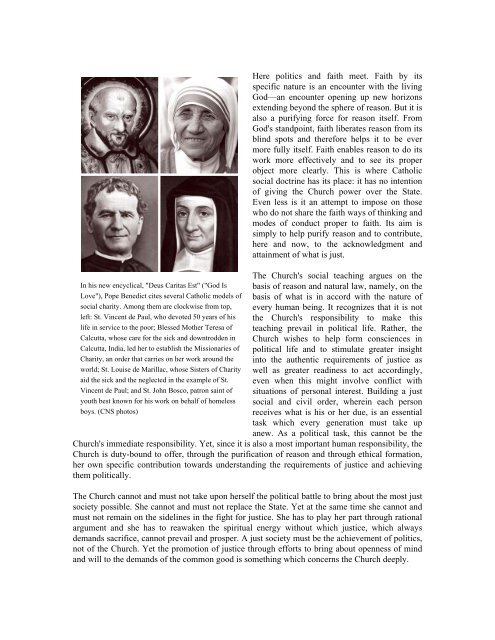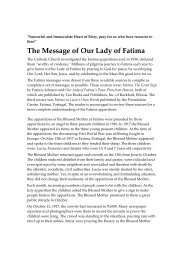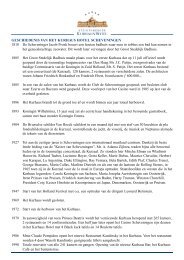In his new encyclical, "Deus Caritas Est" ("<strong>God</strong> <strong>Is</strong><strong>Love</strong>"), Pope Benedict cites several Catholic models ofsocial charity. Among them are clockwise from top,left: St. Vincent de Paul, who devoted 50 years of hislife in service to the poor; Blessed Mother Teresa ofCalcutta, whose care for the sick and downtrodden inCalcutta, India, led her to establish the Missionaries ofCharity, an order that carries on her work around theworld; St. Louise de Marillac, whose Sisters of Charityaid the sick and the neglected in the example of St.Vincent de Paul; and St. John Bosco, patron saint ofyouth best known for his work on behalf of homelessboys. (CNS photos)Here politics and faith meet. Faith by itsspecific nature is an encounter with the living<strong>God</strong>—an encounter opening up new horizonsextending beyond the sphere of reason. But it isalso a purifying force for reason itself. From<strong>God</strong>'s standpoint, faith liberates reason from itsblind spots and therefore helps it to be evermore fully itself. Faith enables reason to do itswork more effectively and to see its properobject more clearly. This is where Catholicsocial doctrine has its place: it has no intentionof giving the Church power over the State.Even less is it an attempt to impose on thosewho do not share the faith ways of thinking andmodes of conduct proper to faith. Its aim issimply to help purify reason and to contribute,here and now, to the acknowledgment andattainment of what is just.The Church's social teaching argues on thebasis of reason and natural law, namely, on thebasis of what is in accord with the nature ofevery human being. It recognizes that it is notthe Church's responsibility to make thisteaching prevail in political life. Rather, theChurch wishes to help form consciences inpolitical life and to stimulate greater insightinto the authentic requirements of justice aswell as greater readiness to act accordingly,even when this might involve conflict withsituations of personal interest. Building a justsocial and civil order, wherein each personreceives what is his or her due, is an essentialtask which every generation must take upanew. As a political task, this cannot be theChurch's immediate responsibility. Yet, since it is also a most important human responsibility, theChurch is duty-bound to offer, through the purification of reason and through ethical formation,her own specific contribution towards understanding the requirements of justice and achievingthem politically.The Church cannot and must not take upon herself the political battle to bring about the most justsociety possible. She cannot and must not replace the State. Yet at the same time she cannot andmust not remain on the sidelines in the fight for justice. She has to play her part through rationalargument and she has to reawaken the spiritual energy without which justice, which alwaysdemands sacrifice, cannot prevail and prosper. A just society must be the achievement of politics,not of the Church. Yet the promotion of justice through efforts to bring about openness of mindand will to the demands of the common good is something which concerns the Church deeply.
) <strong>Love</strong>—caritas—will always prove necessary, even in the most just society. There is noordering of the State so just that it can eliminate the need for a service of love. Whoever wants toeliminate love is preparing to eliminate man as such. There will always be suffering which criesout for consolation and help. There will always be loneliness. There will always be situations ofmaterial need where help in the form of concrete love of neighbour is indispensable. 20 The Statewhich would provide everything, absorbing everything into itself, would ultimately become amere bureaucracy incapable of guaranteeing the very thing which the suffering person—everyperson— needs: namely, loving personal concern. We do not need a State which regulates andcontrols everything, but a State which, in accordance with the principle of subsidiarity,generously acknowledges and supports initiatives arising from the different social forces andcombines spontaneity with closeness to those in need. The Church is one of those living forces:she is alive with the love enkindled by the Spirit of Christ. This love does not simply offer peoplematerial help, but refreshment and care for their souls, something which often is even morenecessary than material support. In the end, the claim that just social structures would makeworks of charity superfluous masks a materialist conception of man: the mistaken notion that mancan live “by bread alone” (Mt 4:4; cf. Dt 8:3)—a conviction that demeans man and ultimatelydisregards all that is specifically human.29. We can now determine more precisely, in the life of the Church, the relationship betweencommitment to the just ordering of the State and society on the one hand, and organizedcharitable activity on the other. We have seen that the formation of just structures is not directlythe duty of the Church, but belongs to the world of politics, the sphere of the autonomous use ofreason. The Church has an indirect duty here, in that she is called to contribute to the purificationof reason and to the reawakening of those moral forces without which just structures are neitherestablished nor prove effective in the long run.The direct duty to work for a just ordering of society, on the other hand, is proper to the layfaithful. As citizens of the State, they are called to take part in public life in a personal capacity.So they cannot relinquish their participation “in the many different economic, social, legislative,administrative and cultural areas, which are intended to promote organically and institutionallythe common good.” 21 The mission of the lay faithful is therefore to configure social life correctly,respecting its legitimate autonomy and cooperating with other citizens according to theirrespective competences and fulfilling their own responsibility. 22 Even if the specific expressionsof ecclesial charity can never be confused with the activity of the State, it still remains true thatcharity must animate the entire lives of the lay faithful and therefore also their political activity,lived as “social charity”. 23The Church's charitable organizations, on the other hand, constitute an opus proprium, a taskagreeable to her, in which she does not cooperate collaterally, but acts as a subject with directresponsibility, doing what corresponds to her nature. The Church can never be exempted frompractising charity as an organized activity of believers, and on the other hand, there will never bea situation where the charity of each individual Christian is unnecessary, because in addition tojustice man needs, and will always need, love.The multiple structures of charitable service in the social context of the present day30. Before attempting to define the specific profile of the Church's activities in the service ofman, I now wish to consider the overall situation of the struggle for justice and love in the worldof today.












